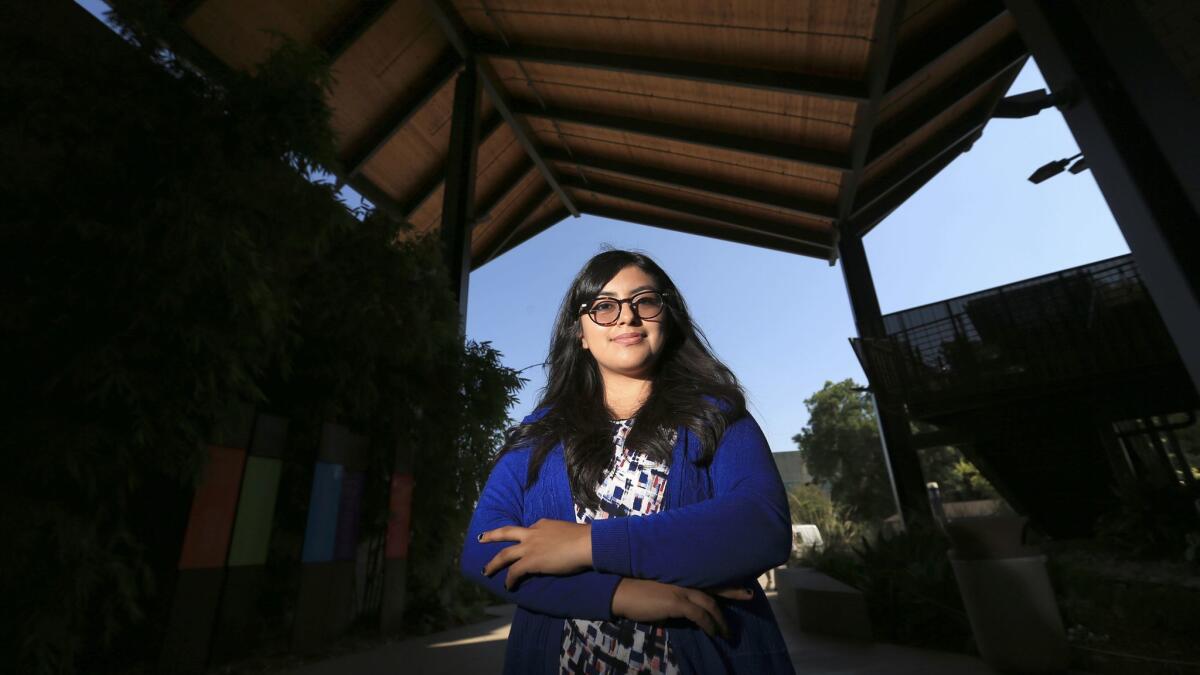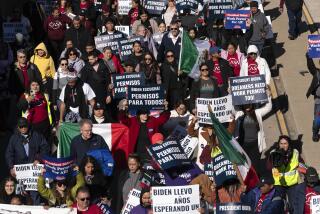Another thing Trump stripped from ‘Dreamers’: A loophole that helped 40,000 of them get green cards

Last month, California college student Miriam Juan stepped off a plane in Guadalajara, Mexico, and hugged her grandparents for the first time in 17 years. She had no words at first, just smiles and tears.
An immigrant brought to the U.S. from Mexico at age 4, Juan was able to make the trip thanks to a little known perk of the Deferred Action for Childhood Arrivals program, an Obama-era initiative that shielded 800,000 “Dreamers” from deportation.
Under the program, young immigrants without legal status could apply for permission to take short trips out of the country for humanitarian, educational or employment purposes, and then return legally to the U.S.
No longer.
President Trump’s decision Tuesday to strip deportation protections for DACA recipients beginning in March also restricts their ability to travel. A Homeland Security memorandum issued Tuesday said the department would stop approving new applications for travel permits, known as advance parole. The agency said it would honor applications that had been approved.
Those in favor of stricter immigration enforcement applauded the White House decision to end the travel program, which some have described as a “back door” to citizenship because it helped tens of thousands of DACA recipients get green cards in recent years.
Migrants applying for legal permanent residence in the U.S. — through sponsorship by a U.S. citizen family member or employer — typically get green cards quickly as long as they have come into the country lawfully or through advance parole.
On the other hand, migrants who crossed the border illegally and have not reentered the U.S. via parole must leave the country and apply for a green card from a U.S. consulate abroad, a process that can take years.
An estimated 40,000 DACA recipients used advance parole to get green cards since DACA was created in 2012, said Claire Nicholson, a spokeswoman for U.S. Citizenship and Immigration Services.
“It’s extremely troubling,” said Ira Mehlman, a spokesman for the Federation for American Immigration Reform, which seeks to reduce levels of immigration. “President Obama said DACA would in no way lead to people getting amnesty or citizenship, and it turned out not to be accurate.”
Migrant advocates acknowledge the immigration benefits of advance parole; in recent years some advocacy groups have coached Dreamers on how to time their green card applications with advance parole trips. Still, many advocates insist the program’s biggest benefit was not potential access to legal status but the chance for tens of thousands of Dreamers to reconnect with their homeland.
“I essentially got to meet my home, meet my grandparents and aunts and uncles and cousins and get to know my culture and my traditions,” said Juan, 21, a math major at Cal Poly Pomona, who spent eight days last month eating her grandmother’s homemade tortillas, learning about her family’s indigenous heritage and strolling the lush green corn fields of her native village.
Juan returned to California a few weeks ago determined to launch a study abroad program on her campus that would allow other Dreamers to travel outside the country with advance parole.
“The U.S. has now robbed us of that,” she said.

In August, California college student Miriam Juan stepped off a plane in Guadalajara, Mexico, and hugged her grandparents for the first time in 17 years.
Juan traveled with the California-Mexico Studies Center, a nonprofit that has arranged for about 160 DACA students to travel to Mexico over the last several years. Along with allotted time for family visits, the trips featured meetings with Mexican officials and seminars on Mexican history and politics.
The group canceled another trip to Mexico planned for December after this week’s announcement that protections would be stripped from DACA students in six months. The administration has asked Congress to write a law during that period to resolve the issue.
“The world changed yesterday for this population of students,” said Armando Vazquez-Ramos, coordinator of the California-Mexico Studies Center and a Chicano studies professor at Cal State Long Beach.
For immigrants brought to the U.S., returning to the country of their birth can be an important experience, he said.
“Some of them were brought to the U.S. when they were in diapers and remember nothing of their countries,” he said. “They dream of connecting with their relatives and recovering their identities.”
Although the chance to visit home countries was happy for many, others found it difficult. Jose Platas Arroyo, a computer science major at Cal State Dominguez Hills, came to the U.S. from Mexico at age 11. He spoke only Spanish then and felt like an outsider. He felt that way again when he went back to Mexico last month with advance parole. People told him he spoke Spanish with an American accent.
“At least I was able to see my family once again after 14 years, but it was a culture shock,” he said. “People heard me talking and looked at me funny. I felt like an outcast in my own country.”
For some who had the chance to travel home, the experience reaffirmed that their lives and identities are now centered in the U.S.
Ricardo Aca, a Dreamer from New York, visited his home state of Puebla, Mexico, in January. He was thrilled to reunite with his younger brother, who was just 4 when Aca and his parents said goodbye and crossed the border. But he was struck by the poverty that abounded, and the children asking for money on the streets.
Aca decided to cut his trip to Mexico short to make sure he was home before Trump’s Jan. 20 inauguration. “We didn’t know when he would take action,” said Aca, who gained national prominence last year when he starred in a video highlighting his job as a server at a sushi restaurant in a Trump condo building in Manhattan.
Although the experience in Mexico was powerful, he felt glad to come home to New York City. “I’ve come to love the U.S. like I love my country,” he said.
Before he left Mexico, his grandmother took him aside.
“I’m glad that you came back,” she said. She said she wasn’t sure she’d be around the next time Aca came back to Mexico.
Twitter: @katelinthicum
ALSO
Who are the ‘Dreamers’ whose dreams have been deferred? You might be surprised
What’s next for DACA and the nearly 800,000 people protected by it
Trump sets contours of a possible legislative compromise for ‘Dreamers’
More to Read
Start your day right
Sign up for Essential California for news, features and recommendations from the L.A. Times and beyond in your inbox six days a week.
You may occasionally receive promotional content from the Los Angeles Times.







